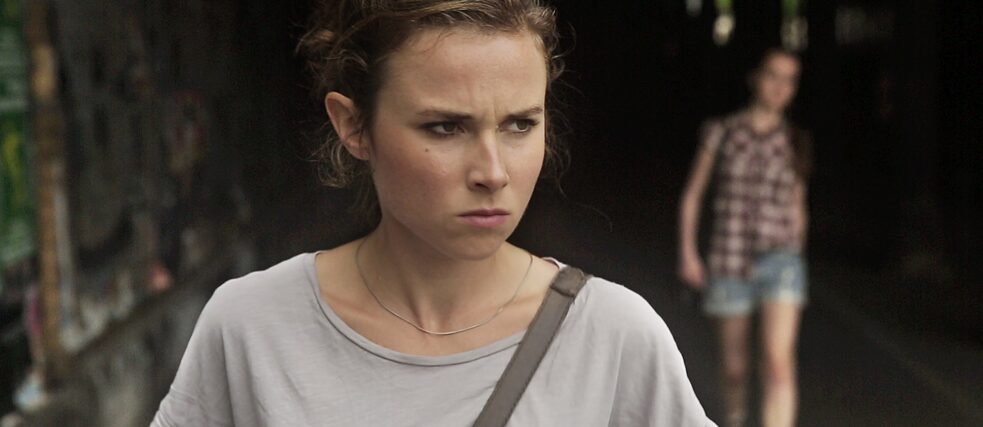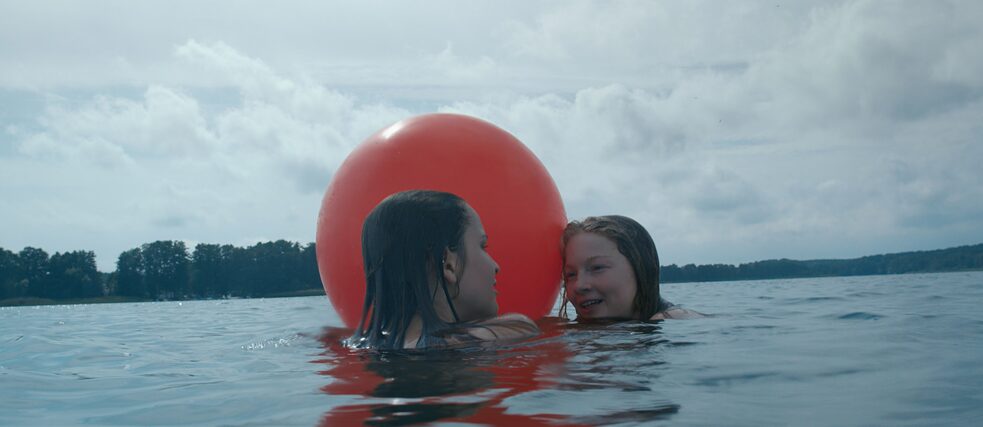The Berlin School
Berlin School: The Space of the City and the Chronopolitics of Film

“Lotte” (2016) by Julius Schultheiß | Photo (detail): © Finderlohnfilm
Space is never neutral. Power always needs space to realize its authority in the process of domination. Without space, power is forever only potential. Chronopolitics, or time politics, is a method of modern power for representing whether a space is urban-modern and not rural-traditional; that the river banks must be free of occupation for a city to be classified as advanced and civilized.
The Logic of Asymmetrical Separation of Modern Culture
Chronopolitics cannot be separated from modernization, since without a representation of what progress is and how progress is made, the modernization machine cannot function. The separation between tradition and modernity and its asymmetrical connection is a form of “rupture, revolution in time” (Latour, 1993) of modern culture. The city is a tangible space for the construction of the chronopolitical idea of modernization. What is a Smart City as opposed to a “disadvantaged city”? What kinds of issues can survive and should be removed (neglected) from the politics of progress?Cinema is the operating room for modern logic. Chronopolitical work determines what is called “drama” and “not drama”. When a couple who are still in high school confronts the reality of an unwanted pregnancy, the future has a different meaning for the man, who is typically a “village boy”, and the woman, who is typically a “child from the residential complex”. The dramatic story can arise from the asymmetrical chronopolitics between the static, traditional “village” and the flowing, global and modern “complex”. Films must be able to demonstrate typical spatial politics in the aesthetics of the space between “motorways” and “narrow alleys”. In order to preserve modern logic, the story ends with children from the complex going into global space to develop knowledge while village children remain in their place of origin and become the past. This modern fairy tale is touching and repeats itself precisely because it is relevant to the logic of asymmetrical separation of modern culture.
Cinema Standing Against the Chronopolitics
The Berlin School is a struggle against modern chronopolitics. Defined as a film movement after the fall of the Berlin Wall, the filmmakers of the Berlin School refused to regard the fall of the Wall as the key moment for a new Germany. Instead, they questioned what Germany is and what its future looks like (seminar at the Deutsche Haus, NYC 2016). They refused to make genre films, including historical and period films. This chronopolitical resistance was of course characteristic not only of the Berlin School—it also became a trend of transnational cinema (Fisher & Abel, 2018). The Berlin School’s affinity with filmmakers such as Apichatpong Weerasetakhul (Thailand), Tsai Ming-Liang (Taiwan) and Steve McQueen (UK) is reflected in its critical vision of disrupting the spatial process of manifesting the asymmetric logic of separation.In the films Schlafkrankheit (Ulrich Köhler, 2011) and Toni Erdmann (Maren Ade, 2016), for example, the meaning of the Third World as a space that is passive and deserves to be colonized by Europeans with the project “world economy”. “Development” is stabilized. The passive space thus becomes an active space, and the person from “Europe” as a person from the modern world feels uncomfortable and questions his/her existence in the business cycle between center and periphery. In Toni Erdmann the father annoys the daughter; does he have to be a typical modern professional man in a transnational space like Bucharest (Romania)? Is there any other possibility of value to represent transnational space than just the space of the workaholics of global precarities? Or In My Room (Ulrich Köhler, 2018), where we are invited to experience what happens when the world becomes a semi-apocalyptic space and only we alone live? What can we possibly do? And if it turns out that the main character meets someone else, do we still have to maintain the same human values, or do we produce completely new values?
 “Schwimmen” (2019) by Luzie Loose | Photo (detail): © Kurhaus Production Film & Medien GmbH
“Schwimmen” (2019) by Luzie Loose | Photo (detail): © Kurhaus Production Film & Medien GmbH
In the spatial dialectical process experienced by Elisa, the water space (public swimming pool, lake) becomes an active mediator that enables Elisa to build her new space in the urban apartment. In this intermediary space, we see Elisa’s process of self-production through the social relationships she establishes with the human actors she currently knows and with non-human actors (gadgets, cameras) she has recently used. Should the city-Elisa be different from the suburb-Elisa? Who or with whom should Elisa answer this question? This process of questioning, of being the self in space, is what drives Elisa’s story through her teenage years in this film.
While Elisa’s space is determined by her parents in Schwimmen, in Lotte (Julius Schultheiß, 2016) we encounter a woman who refuses to be a typical figure. As a nomad, Lotte is not a spaceless self, but she is a self that always creates space for herself. Lotte refuses to be disciplined; she must always produce her domestic space in spaces that are normally not domestic. When she rejects to be disciplined by her boyfriend, Lotte has the opportunity to turn a bicycle repair shop into her bedroom. Public-private in this film become spatial units that are temporary (short lived) and fluid and not a disciplinary dichotomy, since Lotte herself rejects the definition of “mother” and “woman” in the prevailing gender logic.
With long cinematographic shots as one of the hallmarks of the Berlin School, the chronology in this film is not the politics of the time to produce social types; it is rather the politics of the time to understand people, emergent forms or signs of life (Mitchell, 2005) that are incomplete and are always restless in the process.
Author
Aryo Danusiri is an assistant professor of anthropology at the University of Indonesia. An affiliate of the Sensory Ethnography Lab, Danusiri holds a Ph.D. in Social Anthropology with Critical Media Practice from Harvard.